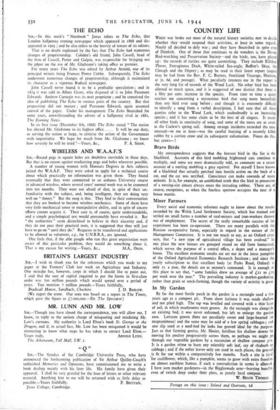COUNTRY LIFE
WHEN war broke out most of the natural history societies met to decide whether they would suspend their activities, at least in some regard,. Nearly all decided to defy war ; and they have flourished in spite even of Dunkirk. One of those that continues to do wonders is the Devon Bird-watching and Preservation Society—and the birds, too, have played up: the records of rarities are quite astonishing. They include Killdeer Plover, Ferruginous Duck, White-tailed Sea-eagle, Buffon's Skua, the Chough and the OSprey ; as may be read in their latest report (copies may be had from the Rev. F. C. Butters, Stockland Vicarage, Honiton, at 3s. 6d. and postage). What peculiarly interests me in the report is the very long list of records of the Wood Lark. No other bird has been allotted so much space, and it is suggested of one district that there is a fifty per cent, increase in the species. From time to time a query reaches me concerning a mysterious bird that sang more beautifully than any bird ever sang before ; and though it is extremely difficult to identify a song from a verbal description, I feel sure that all these queries refer to the Wood Lark, which undoubtedly is an increasing species ; and it has some claim to be the best of all singers. It excels all other birds in continuity of song, and some of the notes are as sweet as the Curlew's spring call. Among strange incidents recorded the most unusual—to me at least—was the careful burying of a recently killed rabbit by a carrion crow and its subsequent exhumation. Foxes do this. but crows—!
Brave Birds
My correspondence suggests that the bravest bird in the list is the blackbird. Accounts of this bird mobbing frightened cats continue to multiply, and some are most dramatically told, as comment on a recent account of a starling mobbing a grey squirrel. For myself I have known of a blackbird that actually perched into hostile action on the back of a cat, and the cat was terrified. Conscience can make cowards of many animals. It is, for example, an established truth that the bird in possession of a nesting-site almost always routs the intruding robber. There are, of course, exceptions, as when the fearless sparrow occupies the nest of a house martin.
Miner Farmers
Every social and economic reformer ought to know about the results recorded by the Welsh Land Settlement Society, which has trained and settled on small farms a number of coal-miners and iron-workers thrown out of employment. The secret of the really remarkable success of the experiment has been co-operation. There are many parallels with the Russian co-operative farms, especially in regard to the nature of the Management Committee. It is not too much to say, as an Oxford critic says, that " a new type of agricultural village has been evolved." In one place the new houses are grouped round an old farm homestead, which serves the purpose of a central office, a depot and a manager's house. The excellent economic results are set out in the latest pamphlet of the Oxford Agricultural Economics Research Institute; and since the yearly subscription to that excellent body (at Parks Road, Oxford) is only xs. a year, the details are at anyone's command. It is enough in this place to say that, "some families drew an average of kit to £12 per week over the year." The prevailing industry is market-gardening. rather than grain or stock-farming, though the variety of activity is great.
In My Garden By far the most fertile patch in the garden is a rectangle used a few years ago as a compost pit. From sheer laziness it was made shallow and not piled high. The top was levelled and covered with a thin 'layer of soil, in which mushrooms were grown. As the rectangle was alongside an existing bed, it was never exhumed, but left to enlarge the garden area. Lettuces grown there are peculiarly sweet and large-hearted (Or magnanimous) and the same may be said of a few spring cabbages ; and one slip used as a seed-bed for leeks has proved ideal for the purpose. Just as that farming genius, Mr. Hosier, fertilises his shallow downs by moving his poultry progressively across them, so perhaps we might go through our vegetable gardens by a succession of shallow compost pits. It is a garden crime to burn any tolerably soft leaf, say of rhubarb or cabbage ; and if the softer leaves only are used in such places, the ground is fit for use within a comparatively few months. Such a site is ideal for cauliflower, which, like a pumpkin, seems to grow with extra freedom on almost earthless humus, if such a contradiction in terms is allowed. I have seen market gardeners—in the Biggleswade area—burying bundles even of twitch deep under their plots, as purely local compost.
W. BEACH THOMAS.
Postage on this issue : Inland and Overseas, ad


























 Previous page
Previous page